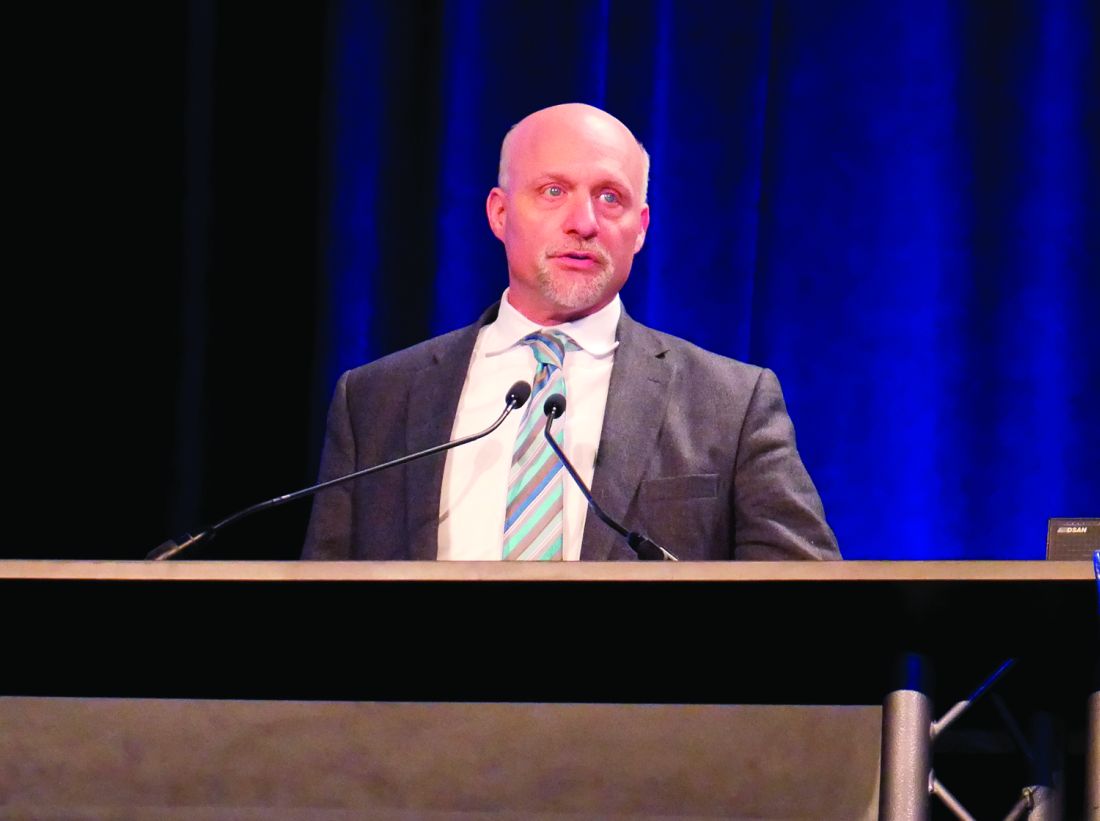User login
PHILADELPHIA – according to a recent presentation at the annual meeting of the American College of Gastroenterology.
Steven L. Flamm, MD, from Northwestern University, Chicago, and his colleagues examined results from a previous randomized, double-blinded trial of 140 patients receiving twice-daily rifaximin at 550 mg for 6 months in which the results showed rifaximin successfully maintained remission of hepatic encephalopathy (HE), compared with 159 patients receiving placebo.
“This pivotal study was published in March of 2010, but one of the post hoc assessments that was not performed was looking at various different phases of hepatic impairment as dictated by [Child-Pugh] class and each of those responses to this product,” Dr. Flamm said in his presentation.
Patients in the study were included if they had a Model For End-Stage Liver Disease score of 25 or less and two or more overt HE within 6 months (Conn score 1 or less) but were currently in remission. The researchers allowed the use of concomitant lactulose during the study period, which was used in 94.1% of rifaximin and 91.2% of placebo patients.
In the post hoc analysis, Dr. Flamm and his colleagues divided rifaximin and placebo patients into Child-Pugh class A (46 patients vs. 56 patients), class B (65 patients vs. 72 patients), and class C (17 patients vs. 14 patients) groups. For rifaximin and placebo patients, the mean age was 57.3 years and 57.2 years in the class A group, 54.4 years and 57.0 years in the class B group, and 56.1 years and 57.6 years in the class C group, respectively.
Overall, 8 of 46 rifaximin patients (17.4%) in the Child-Pugh class A and 15 of 65 rifaximin patients (23.1%) in the class B groups experienced an overt HE event during the 6-month study period, compared with 26 of 56 patients in the class A (46.4%) and 32 of 72 patients (44.4%) in the class B placebo groups; 5 of 17 rifaximin patients (29.4%) in the Child-Pugh class C group experienced their first overt HE event, compared with 9 of 14 (64.3%) patients in the placebo group.
With regard to first HE-related hospitalization, 5 of 46 patients (10.9%) in the rifaximin Child-Pugh class A group, 8 of 65 rifaximin patients (12.3%) in the class B group, and 4 of 17 rifaximin patients (23.5%) in the class C group experienced hospitalization because of HE, compared with 15 of 56 patients (23.2%) in the Child-Pugh class A group, 15 of 72 patients (20.8%) in the class B group, and 5 of 14 patients (35.7%) in the class C placebo group. The researchers noted lactulose use in the majority of patient cases in the study “provided further benefit” in reducing overt HE events.
“Although numeric differences were observed favoring rifaximin for the incidence of HE-related hospitalizations, a risk reduction versus placebo could not be firmly established, and presumably this was largely due to a lack of adequate power because of small sample size,” Dr. Flamm said.
This study and its analysis were supported by Salix Pharmaceuticals. Dr. Flamm and other coauthors report advisory committee membership, board membership, employment, or consultancy with AbbVie, Bristol-Myers Squibb, Gilead Sciences, Intercept Pharmaceuticals, Merck and Salix Pharmaceuticals. One coauthor reported no relevant conflicts of interest.
SOURCE: Flamm SL et al ACG 2018, Presentation 58.
PHILADELPHIA – according to a recent presentation at the annual meeting of the American College of Gastroenterology.
Steven L. Flamm, MD, from Northwestern University, Chicago, and his colleagues examined results from a previous randomized, double-blinded trial of 140 patients receiving twice-daily rifaximin at 550 mg for 6 months in which the results showed rifaximin successfully maintained remission of hepatic encephalopathy (HE), compared with 159 patients receiving placebo.
“This pivotal study was published in March of 2010, but one of the post hoc assessments that was not performed was looking at various different phases of hepatic impairment as dictated by [Child-Pugh] class and each of those responses to this product,” Dr. Flamm said in his presentation.
Patients in the study were included if they had a Model For End-Stage Liver Disease score of 25 or less and two or more overt HE within 6 months (Conn score 1 or less) but were currently in remission. The researchers allowed the use of concomitant lactulose during the study period, which was used in 94.1% of rifaximin and 91.2% of placebo patients.
In the post hoc analysis, Dr. Flamm and his colleagues divided rifaximin and placebo patients into Child-Pugh class A (46 patients vs. 56 patients), class B (65 patients vs. 72 patients), and class C (17 patients vs. 14 patients) groups. For rifaximin and placebo patients, the mean age was 57.3 years and 57.2 years in the class A group, 54.4 years and 57.0 years in the class B group, and 56.1 years and 57.6 years in the class C group, respectively.
Overall, 8 of 46 rifaximin patients (17.4%) in the Child-Pugh class A and 15 of 65 rifaximin patients (23.1%) in the class B groups experienced an overt HE event during the 6-month study period, compared with 26 of 56 patients in the class A (46.4%) and 32 of 72 patients (44.4%) in the class B placebo groups; 5 of 17 rifaximin patients (29.4%) in the Child-Pugh class C group experienced their first overt HE event, compared with 9 of 14 (64.3%) patients in the placebo group.
With regard to first HE-related hospitalization, 5 of 46 patients (10.9%) in the rifaximin Child-Pugh class A group, 8 of 65 rifaximin patients (12.3%) in the class B group, and 4 of 17 rifaximin patients (23.5%) in the class C group experienced hospitalization because of HE, compared with 15 of 56 patients (23.2%) in the Child-Pugh class A group, 15 of 72 patients (20.8%) in the class B group, and 5 of 14 patients (35.7%) in the class C placebo group. The researchers noted lactulose use in the majority of patient cases in the study “provided further benefit” in reducing overt HE events.
“Although numeric differences were observed favoring rifaximin for the incidence of HE-related hospitalizations, a risk reduction versus placebo could not be firmly established, and presumably this was largely due to a lack of adequate power because of small sample size,” Dr. Flamm said.
This study and its analysis were supported by Salix Pharmaceuticals. Dr. Flamm and other coauthors report advisory committee membership, board membership, employment, or consultancy with AbbVie, Bristol-Myers Squibb, Gilead Sciences, Intercept Pharmaceuticals, Merck and Salix Pharmaceuticals. One coauthor reported no relevant conflicts of interest.
SOURCE: Flamm SL et al ACG 2018, Presentation 58.
PHILADELPHIA – according to a recent presentation at the annual meeting of the American College of Gastroenterology.
Steven L. Flamm, MD, from Northwestern University, Chicago, and his colleagues examined results from a previous randomized, double-blinded trial of 140 patients receiving twice-daily rifaximin at 550 mg for 6 months in which the results showed rifaximin successfully maintained remission of hepatic encephalopathy (HE), compared with 159 patients receiving placebo.
“This pivotal study was published in March of 2010, but one of the post hoc assessments that was not performed was looking at various different phases of hepatic impairment as dictated by [Child-Pugh] class and each of those responses to this product,” Dr. Flamm said in his presentation.
Patients in the study were included if they had a Model For End-Stage Liver Disease score of 25 or less and two or more overt HE within 6 months (Conn score 1 or less) but were currently in remission. The researchers allowed the use of concomitant lactulose during the study period, which was used in 94.1% of rifaximin and 91.2% of placebo patients.
In the post hoc analysis, Dr. Flamm and his colleagues divided rifaximin and placebo patients into Child-Pugh class A (46 patients vs. 56 patients), class B (65 patients vs. 72 patients), and class C (17 patients vs. 14 patients) groups. For rifaximin and placebo patients, the mean age was 57.3 years and 57.2 years in the class A group, 54.4 years and 57.0 years in the class B group, and 56.1 years and 57.6 years in the class C group, respectively.
Overall, 8 of 46 rifaximin patients (17.4%) in the Child-Pugh class A and 15 of 65 rifaximin patients (23.1%) in the class B groups experienced an overt HE event during the 6-month study period, compared with 26 of 56 patients in the class A (46.4%) and 32 of 72 patients (44.4%) in the class B placebo groups; 5 of 17 rifaximin patients (29.4%) in the Child-Pugh class C group experienced their first overt HE event, compared with 9 of 14 (64.3%) patients in the placebo group.
With regard to first HE-related hospitalization, 5 of 46 patients (10.9%) in the rifaximin Child-Pugh class A group, 8 of 65 rifaximin patients (12.3%) in the class B group, and 4 of 17 rifaximin patients (23.5%) in the class C group experienced hospitalization because of HE, compared with 15 of 56 patients (23.2%) in the Child-Pugh class A group, 15 of 72 patients (20.8%) in the class B group, and 5 of 14 patients (35.7%) in the class C placebo group. The researchers noted lactulose use in the majority of patient cases in the study “provided further benefit” in reducing overt HE events.
“Although numeric differences were observed favoring rifaximin for the incidence of HE-related hospitalizations, a risk reduction versus placebo could not be firmly established, and presumably this was largely due to a lack of adequate power because of small sample size,” Dr. Flamm said.
This study and its analysis were supported by Salix Pharmaceuticals. Dr. Flamm and other coauthors report advisory committee membership, board membership, employment, or consultancy with AbbVie, Bristol-Myers Squibb, Gilead Sciences, Intercept Pharmaceuticals, Merck and Salix Pharmaceuticals. One coauthor reported no relevant conflicts of interest.
SOURCE: Flamm SL et al ACG 2018, Presentation 58.
REPORTING FROM ACG 2018
Key clinical point: Child-Pugh class does not significantly affect the overt hepatic encephalopathy recurrence rate in patients taking rifaximin, compared with placebo.
Major finding: A total of 17.4% of Child-Pugh class A, 23.1% of class B, and 29.4% class C patients taking rifaximin experienced overt hepatic encephalopathy, compared with 46.4% of Child-Pugh class A, 44.4% of class B, and 64.3% of class C patients receiving placebo.
Study details: A post hoc analysis of 299 patients receiving twice-daily rifaximin or placebo for 6 months.
Disclosures: This study and its analysis were supported by Salix Pharmaceuticals. Dr. Flamm and other coauthors reported advisory committee membership, board memberships, employment, or consultancy with AbbVie, Bristol-Myers Squibb, Gilead Sciences, Intercept Pharmaceuticals, Merck, and Salix Pharmaceuticals. One coauthor reported no relevant conflicts of interest.
Source: Flamm SL et al. ACG 2018, Presentation 58.

